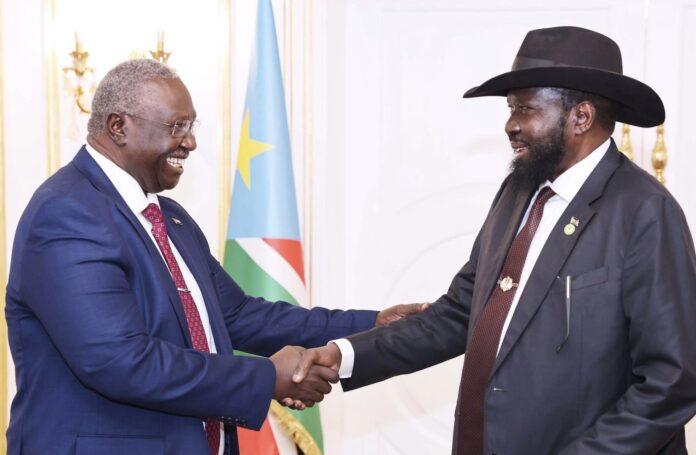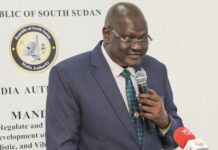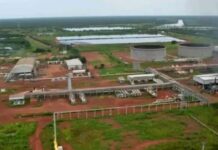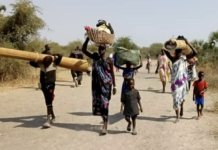
President Salva Kiir Mayardit on Monday hosted Sudan’s Deputy Chairman of the Sovereign Council, Malik Agar Eyre, in Juba for a high-level bilateral meeting focused on strengthening ties between South Sudan and Sudan, with a particular emphasis on economic collaboration and regional security.
The talks come at a time of heightened political and economic challenges in both countries, underscoring the importance of maintaining strong diplomatic channels between Juba and Khartoum.
Following the closed-door meeting, South Sudan’s Minister of Foreign Affairs, Monday Semaya Kumba, addressed journalists, stating that the discussions reflected a mutual interest in enhancing economic integration, trade partnerships, and joint efforts to address shared security concerns.
“Today’s meeting was centered on revitalizing and expanding economic cooperation between our two nations and exploring practical mechanisms to promote stability along our shared border,” Minister Kumba said.
“We also received updates from our Sudanese counterparts on the current developments in Sudan, including the internal security situation and economic outlook.”
Minister Kumba reiterated South Sudan’s longstanding commitment to peace and mutual development with Sudan, stressing that both nations have a responsibility to foster regional harmony.
“We assured our brothers and sisters in Sudan of Juba’s unwavering commitment to peaceful cooperation and shared development,” he added.
With both nations having experienced recent bouts of instability, the meeting also addressed pressing cross-border security concerns, including arms trafficking, displacement, and the activities of non-state armed groups operating along the shared frontier.
The leaders discussed potential frameworks for coordinated border management, intelligence sharing, and future security cooperation to ensure that both populations enjoy lasting peace.
“South Sudan and Sudan not only share a border but a common destiny. Stability in one country directly affects the other,” Minister Kumba noted. “This is why we are committed to working closely with Khartoum on practical and peaceful solutions.”
On the economic front, both parties emphasized the importance of revitalizing trade routes and infrastructure development. The Sudanese delegation expressed a desire to increase bilateral trade, particularly in agriculture, oil, and transport, while also seeking South Sudan’s support in efforts to stabilize Sudan’s economy.
Sudan’s Ambassador to South Sudan, Issam Mohammed Hassan Karrar, who was part of the delegation, reaffirmed Khartoum’s readiness to enhance cooperation across all sectors.
“Our government is committed to deepening ties with South Sudan and advancing mutual interests in trade, development, and peace,” Ambassador Karrar told reporters.
“We value the relationship with Juba and believe it holds the key to stronger regional integration in the Horn of Africa.”
While no formal agreements were signed during Monday’s talks, both sides expressed optimism about the direction of the relationship and committed to holding follow-up meetings to develop concrete action plans.
Observers say the renewed diplomatic engagement between Juba and Khartoum is a positive signal amid growing concerns over regional instability, and it may pave the way for deeper collaboration through regional bodies such as the Intergovernmental Authority on Development (IGAD) and the African Union.
The visit by Malik Agar is seen as part of Khartoum’s broader efforts to re-engage with regional partners, while Juba continues to position itself as a bridge for dialogue in East Africa’s evolving political landscape.




